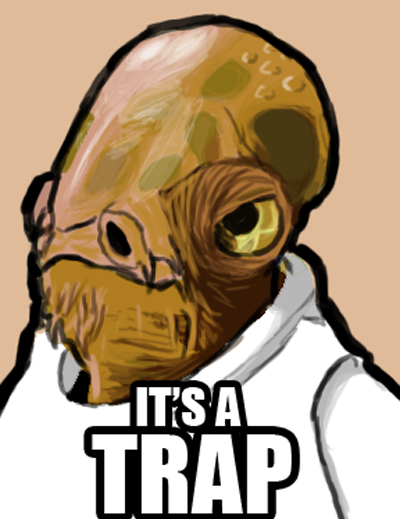ok lets start again...
pretend you never played D&D before. You are about to make your first character. You sit down with the 3.5 PHB and almost every class feature the rogue gets is combat. The book says your not the best at combat, but you see this class called fighter, and these other similar classes paladin, Ranger, and barbarian... so you make the assumption those are the main combat classes (full base attack) you then look that there are some classes that get large lists of spells Wizard, Sorcerer, Cleric, and Druid. There is one class that doesn't fit this... the Bard seems half way between the two.
If you don't know the system, you don't see everything, only the basics... and you will fall into traps...
"Gee I want to be a tough guy, does taking the toughness feat do that?"
"Gee Rogue is another way of saying swashbuckler or cheerful adventurer..."
"If this game tonight is going to be a big fight then FIghter must be the best for that"
"Strider was a Ranger, and he was the best swordman ever... how do I get the combat style for sword an shield?"
WHen in reality Toughness is a weak feat, and if you are looking to be tought it wont help much
Rogues are stuck inbetween being rogue's and thieves... way back when (14 years ago now) they changed the name but never fully changed the class...
The best at combat is a buffed druid shareing the buffs with his animal companion
Strider had more in common with a 4e warlord then a 2e,3e, or 4e ranger... (Although I think I was told 1e ranger was close...)
http://en.wikipedia.org/wiki/Swashbuckler
[sblock]Swashbuckler (a.k.a. swasher) is a term that emerged in the 16th century[1] and has been used as a term for pirates and swordsmen ever since. A possible explanation for this term is that it derives from a fighting style using a side-sword with a buckler in the off-hand, which was applied with much "swashing and making a noise on the buckler".[2] Later the name "swashbuckler" (like gunslinger) became common for an archetype and the accordant special film genre.[3]
The swashbuckler as an archetype[edit]
The word swashbuckler generally describes a protagonist who is heroic and idealistic to the bone and who rescues damsels in distress. His opponent is typically characterised as the dastardly villain. There is a long list of swashbucklers who combine outstanding courage, swordfighting skill, resourcefulness, chivalry and a distinctive sense of honor and justice, as for example The Three Musketeers, The Scarlet Pimpernel, Robin Hood[4] and Zorro.[5]
Classic swashbucklers[edit]
The genre has, apart from swordplay, always been characterized by influences that can be traced back to the chivalry tales of Medieval Europe, such as the legends of Robin Hood and the King Arthur. It soon created its own drafts based on classic examples like The Three Musketeers (1921), Scaramouche (1923) and The Scarlet Pimpernel (1934). Some films did also use motifs of pirate stories.[7] Often these films were adaptations of classic historic novels published by well-known authors such as Alexandre Dumas, Rafael Sabatini, Baroness Emma Orczy, Sir Walter Scott, Johnston McCulley, and Edmond Rostand. Swashbucklers are one of the most flamboyant Hollywood film genres,[8] unlike cinema verite or modern realistic filmmaking. The genre attracted large audiences who relished the blend of escapist adventure, historic romance, and daring stunts in cinemas before it became a fixture on TV screens.
As a first variation of the classic swashbuckler there have also been female swashbucklers.[9] Maureen O'Hara in Against All Flags and Jean Peters in Anne of the Indies were very early action film heroines.
Modern swashbucklers[edit]
Eventually the typical swashbuckler motifs were used up because they had so often been shown on TV screens. Late films such as The Princess Bride, Pirates of the Caribbean and The Mask of Zorro had to modify the classic archetype to attract a big audience. The modifications of the swashbuckler archetype went so far that he even became the villain in 1995's Rob Roy film. Tim Roth plays an accomplished fencer who is overly ambitious and elegant. The final fight between Roth's character Archibald Cunningham and the protagonist demonstrates the differences between a so-called swashbuckler and a man who applies a previous combat style while swinging a heavier blade
[/sblock]
so now what? Does everyone on Wikipedia have the idea wrong about swashbucklers being good in a fight?



